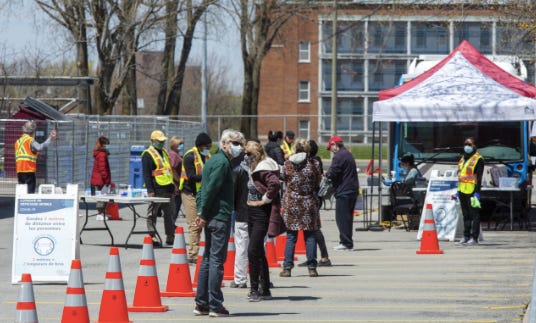Issue 41: Should Canada regularize the immigration status of asylum seekers helping fight COVID-19?
A clear path to permanent residency for asylum seekers is not just right on compassionate grounds, it will also provide a source of workers for a crucial sector
Today’s briefing is by F. Leslie Seidle (FLS), who is a public policy consultant in Montreal.

(A mobile testing facility in Montreal North)
Background
In the Montreal area, the impact of the COVD-19 crisis on older residents has been exacerbated by a severe shortage of staff and poor conditions in many long-term care residences (known in French by the acronym CHSLD). Hundreds of asylum seekers have provided a range of services to residents, whether as paid workers or volunteers. A considerable number of these newcomers also succumbed to the virus.
On May 7, 2020, Concertation haïtienne pour les migrant.es, a coalition of organizations from Montreal’s Haitian community, wrote Prime Minister Justin Trudeau, asking for the implementation of a special immigration program to regularize the status of COVID-19 front-line workers seeking asylum. The rationale was that: “In exceptional circumstances, these individuals offer us their skills, dedication and dignity to help us fight this pandemic … while putting their own health and that of their families at risk. Many of them have nearly died, many have lost co-workers. We find it hard to believe that [they] may be expelled from the country once the battle is won.”
Many of these asylum seekers entered Canada irregularly since summer 2017. As Robert Schertzer and Mireille Paquet explain, these flows reflected the anti-immigration policies of U.S. President Donald Trump and the increasingly inhospitable global climate toward refugee resettlement. The border crossers relied on what some consider a loophole in the 2004 Canada-U.S. Safe Third Country Agreement. It stipulates that migrants who land first in the United States cannot claim asylum at ports of entry to Canada, and vice-versa. People who manage to cross the border elsewhere may therefore make asylum claims. Between February 2017 and February 2020 (inclusive), 55,307 refugee claims were made by persons who crossed irregularly from upstate New York into southern Quebec via the Roxham Road. By February 2020 the number had dropped to 995. On March 21, 2020 the Roxham Road ‘entry’ was closed in response to COVID-19.

Asylum seekers and long term care
Between February 2017 and December 2019, 8,557 of the border crossers claimed they had faced persecution in Haiti. This was exceeded only by Nigeria, with 15,376 claims. There is a huge backlog in cases before the Immigration and Refugee Board of Canada. By the end of 2019, 4,820 Haitian claims were pending (this includes claims that are being appealed). Even before the COVID-19 travel restrictions, deportations to Haiti had been suspended – apparently in response to the worsening political situation and increased violence in the country. However, their possible resumption is a major source of uncertainty among Haitian and other asylum seekers.
A considerable number of Haitian asylum seekers have become préposés aux bénéficiares -- patient attendants (sometimes called orderlies). As Marjorie Villefranche (director general, Maison d’Haïti) explained in an interview, asylum seekers were encouraged to become patient attendants because, after completing the relatively short (three to six months) training course, they could easily find employment in a CHSLD. Villefranche estimates that up to 800 Haitian asylum seekers are working in these homes. A considerable proportion live in the Montréal-Nord borough. In part because of community transmission from asylum seekers who caught the virus in a care home, as of May 19, the borough had the highest number of confirmed COVID-19 cases in Montreal.
Catherine Fournier, an independent member, introduced a motion in the Quebec Assemblée nationale on May 14, 2020, calling on the federal government to regularize the status of asylum seekers working in care homes. It was supported by all parties except the governing Coalition avenir Québec. On May 21, Premier Legault stated: “We can’t just open the door and say: ‘If you come here illegally and find a job, it’s OK, we’ll accept you as an immigrant.’ That’s not how it works.” (my translation) He also indicated that the ball was in the federal government’s court. On May 25, Legault softened his position somewhat and indicated that the Quebec immigration minister would look at the situation on a case-by-case basis as a way of saying “thank you.”
Options for Ottawa
The Justin Trudeau government began its first term with an ambitious humanitarian program that led to the resettlement of more than 40,000 refugees in Canada. Although the present circumstances are different, our response to COVID-19 calls for compassion in a range of policy fields. If the federal government decided to act on the proposal from Concertation haïtienne, what are the options?
One suggestion is that asylum seekers employed in long-term care homes be granted permanent residence under a one-time federal program — as has sometimes been done in the past. For example, in 2009 a program was instituted for people who had been interpreters for diplomats and soldiers during Canada’s mission in Afghanistan or who were injured while working for the Canadian government in Kandahar. A total of 348 people, along with their spouses and children, were accepted.
Such a program could lead to inequities, however. For example, should a patient attendant who began working in a care home only since the COVID-19 outbreak be treated the same as one who started a year or more earlier? What about asylum seekers working in other essential services? Moreover, what some might label an amnesty could be criticized as an easy ‘green light’ compared to the requirements of regular immigration programs.
An alternative approach would be to develop a two-step migration pathway for asylum seekers who have worked in long-term care homes and similar institutions. The two-step principle underlies a number of federal immigration programs. The largest is the Canadian Experience Class, through which certain temporary foreign workers (TFWs) can apply for permanent residence after a year’s employment. However, because the program is open only to TFWs with job experience in higher-skilled jobs, patient attendants would not qualify.
Quebec has a similar program, Programme de l’expérience québécoise (PEQ). However, patient attendants would not qualify for the PEQ either. In a May 19 letter to the Quebec immigration minister, Fournier proposed an adjunct two-step migration program, PEQ-santé, which would be open to asylum seekers working as patient attendants. The PEQ is currently under review. However, in light of Premier Legault’s position Fournier’s proposal is unlikely to go very far.
The federal government does have some two-step programs for individuals working in what are classed as “less-skilled” jobs. In June 2019, it launched the Home Child Care Provider Pilot and the Home Support Worker Pilot. After 24 months’ experience as a temporary worker, participants in one of the pilots can apply for permanent residence for themselves and their families.
On May 15, 2020, applications opened for the federal Agri-Food Pilot, which will help employers in the meat processing, mushroom and greenhouse production, and livestock-raising industries hire full-time, year-round employees. 2,750 applications will be accepted annually. The pilot applies primarily to temporary foreign workers already in Canada and provides a pathway to permanent residence.
Designing a new two-step program (or pilot) for persons working in long-term care homes would not be that difficult. Eligibility would be determined principally by the nature of the work being performed, using the National Occupation Classification. Qualifying candidates would become TFWs and retain that status until, after having worked the requisite amount of time (one or two years would be reasonable), they became permanent residents. An applicant who had worked in a care home prior to the program’s creation should be credited with the relevant number of months/years. Anyone who stopped working in one of the designated fields would be removed from the program, thus losing the opportunity to become a permanent resident.
In light of the Quebec government’s significant role in the immigration field, reflected in the 1991 Canada-Quebec accord, it would be preferable to have at least its tacit agreement for the creation of such a program. However, the federal government has responsibility for asylum policy and the Temporary Foreign Worker program. Moreover, the number of candidates for the new program would not be large and would not count against the Quebec government’s annual target for economic immigrants. For its part, in light of its commitment to increase the annual total immigration to Canada by 10,000 in 2021 and 2022, the federal government should have no difficulty accommodating the additional permanent residents.
In light of the severe labour shortage in long-term care homes – not just in Quebec – a new two-step program along the lines of the one described above could profitably become ongoing. It would potentially attract TFWs already in Canada or people wanting to immigrate here. Its creation would thus be a compassionate recognition of the important contribution asylum seekers have been making in the fight against COVID-19 as well as a continuing avenue to recruit workers for a sector where demand will only increase.
Senator Ratna Omidvar, one of Canada’s leading authorities on migration, wrote recently that after COVID “we will need workers at all ends of the spectrum – from scientists and professors, to trade workers and caregivers.” Those considering the future of the country’s migration policy should heed this advice. A rebalancing of programs to take better account of the range of workers Canada requires can only strengthen our well-regarded immigration system. (FLS)

Binge: The 50 greatest Netflix TV shows of all time
Stream: Poolside FM, the super-summer interweb radio station
Read: Thanks to their strategic reserves, cocaine traffickers are handling the lockdown just fine
Practice: Got game? Join soccer legend Christine Sinclair in doing keep-ups during MS Awareness Month:


___
Policy for Pandemics is produced and edited by Andrew Potter and co-edited by Charlotte Reboul and Paisley Sim (bios here) If you have any feedback or would like to contribute to this newsletter, please send an email to andrew2.potter@mcgill.ca

